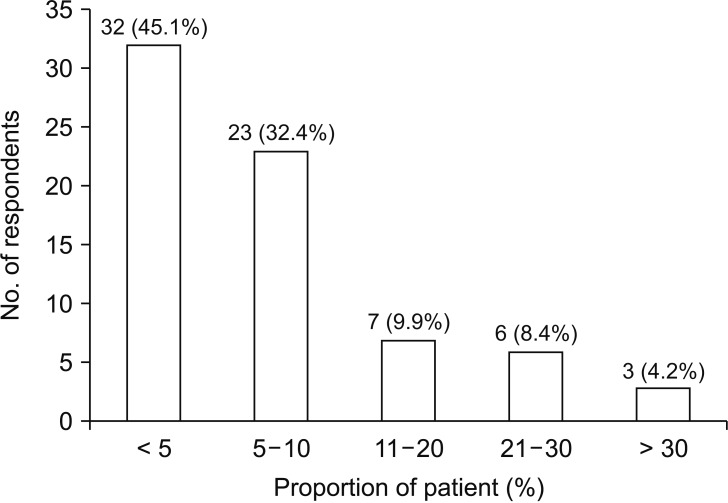Clin Orthop Surg.
2020 Mar;12(1):60-67. 10.4055/cios.2020.12.1.60.
Definition, Diagnosis, Treatment, and Prognosis of Frozen Shoulder: A Consensus Survey of Shoulder Specialists
- Affiliations
-
- 1Department of Orthopedic Surgery, Dongsan Medical Center, Keimyung University School of Medicine, Daegu, Korea. osmdkdh@gmail.com
- 2Department of Rehabilitation Medicine, Dongsan Medical Center, Keimyung University School of Medicine, Daegu, Korea.
- 3Department of Orthopedic Surgery, The Open Hospital, Daegu, Korea.
- KMID: 2470052
- DOI: http://doi.org/10.4055/cios.2020.12.1.60
Abstract
- BACKGROUND
The objective of this study was to identify a consensus on definition, diagnosis, treatment, and prognosis of frozen shoulder (FS) among shoulder specialists.
METHODS
A questionnaire composed of 18 questions about FS"”definition, classification, utilization of diagnostic modalities, the propriety of treatment at each stage, and prognosis"”was sent to 95 shoulder specialists in Korea. Most questions (15 questions) required an answer on a 5-point analog scale (1, strongly disagree; 5, strongly agree); three questions about the propriety of treatment were binary.
RESULTS
We received 71 responses (74.7%). Of the 71 respondents, 84.5% agreed with the proposed definition of FS, and 88.8% agreed that FS should be divided into primary and secondary types according to the proposed definition. Only 43.7% of the respondents agreed that FS in patients with systemic disease should be classified as secondary FS. For the diagnosis of FS, 71.9% agreed that plain radiography should be used and 64.8% agreed ultrasonography should be used. There was a high consensus on proper treatment of FS: 97.2% agreed on education, 94.4%, on the use of nonsteroidal anti-inflammatory drugs; 76.1%, on intra-articular steroid injections; and 97.2%, on stretching exercise. Among all respondents, 22.5% answered that more than 10% of the patients with FS do not respond to conservative treatment.
CONCLUSIONS
The survey revealed a general consensus among shoulder specialists on the definition and treatment of FS. However, classification of FS was found controversial.
Keyword
MeSH Terms
Figure
Reference
-
1. Neviaser JS. Adhesive capsulitis of the shoulder: a study of the pathological findings in periarthritis of the shoulder. J Bone Joint Surg Am. 1945; 27(2):211–222.2. Bunker TD. Time for a new name for ‘frozen shoulder’. Br Med J (Clin Res Ed). 1985; 290(6477):1233–1234.
Article3. Grey RG. The natural history of “idiopathic” frozen shoulder. J Bone Joint Surg Am. 1978; 60(4):564. PMID: 670287.
Article4. Neviaser AS, Neviaser RJ. Adhesive capsulitis of the shoulder. J Am Acad Orthop Surg. 2011; 19(9):536–542. PMID: 21885699.
Article5. Wong CK, Levine WN, Deo K, et al. Natural history of frozen shoulder: fact or fiction? A systematic review. Physiotherapy. 2017; 103(1):40–47. PMID: 27641499.
Article6. Zuckerman JD, Rokito A. Frozen shoulder: a consensus definition. J Shoulder Elbow Surg. 2011; 20(2):322–325. PMID: 21051244.
Article7. Codman EA. The shoulder: rupture of the supraspinatus tendon and other lesions in or about the subacromial bursa. Boston, MA: Thomas Todd;1934.8. Hand C, Clipsham K, Rees JL, Carr AJ. Long-term outcome of frozen shoulder. J Shoulder Elbow Surg. 2008; 17(2):231–236. PMID: 17993282.
Article9. Shaffer B, Tibone JE, Kerlan RK. Frozen shoulder: a long-term follow-up. J Bone Joint Surg Am. 1992; 74(5):738–746. PMID: 1624489.
Article10. Bell S, Coghlan J, Richardson M. Hydrodilatation in the management of shoulder capsulitis. Australas Radiol. 2003; 47(3):247–251. PMID: 12890243.
Article11. Eljabu W, Klinger HM, von Knoch M. Prognostic factors and therapeutic options for treatment of frozen shoulder: a systematic review. Arch Orthop Trauma Surg. 2016; 136(1):1–7. PMID: 26476720.
Article12. Griesser MJ, Harris JD, Campbell JE, Jones GL. Adhesive capsulitis of the shoulder: a systematic review of the effectiveness of intra-articular corticosteroid injections. J Bone Joint Surg Am. 2011; 93(18):1727–1733. PMID: 21938377.13. Hsu JE, Anakwenze OA, Warrender WJ, Abboud JA. Current review of adhesive capsulitis. J Shoulder Elbow Surg. 2011; 20(3):502–514. PMID: 21167743.
Article14. Neviaser AS, Hannafin JA. Adhesive capsulitis: a review of current treatment. Am J Sports Med. 2010; 38(11):2346–2356. PMID: 20110457.15. Oh JH, Oh CH, Choi JA, Kim SH, Kim JH, Yoon JP. Comparison of glenohumeral and subacromial steroid injection in primary frozen shoulder: a prospective, randomized short-term comparison study. J Shoulder Elbow Surg. 2011; 20(7):1034–1040. PMID: 21816628.
Article16. Robinson CM, Seah KT, Chee YH, Hindle P, Murray IR. Frozen shoulder. J Bone Joint Surg Br. 2012; 94(1):1–9.
Article17. Sheridan MA, Hannafin JA. Upper extremity: emphasis on frozen shoulder. Orthop Clin North Am. 2006; 37(4):531–539. PMID: 17141009.
Article18. Ryan V, Brown H, Minns Lowe CJ, Lewis JS. The pathophysiology associated with primary (idiopathic) frozen shoulder: A systematic review. BMC Musculoskelet Disord. 2016; 17(1):340. PMID: 27527912.
Article19. Kwaees TA, Charalambous CP. Rates of surgery for frozen shoulder: an experience in England. Muscles Ligaments Tendons J. 2016; 5(4):276–279. PMID: 26958535.
Article
- Full Text Links
- Actions
-
Cited
- CITED
-
- Close
- Share
- Similar articles
-
- Ultrasound Guidance for Intra-Articular Shoulder Injections for Frozen Shoulder
- Comparison of Suprascapular Nerve Block and Shoulder Joint Injection for Treatment of Frozen Shoulder
- Treatment Strategy for Frozen Shoulder
- Changes of rotator Cuff using Ultrasonography in Frozen Shoulder
- The therapeutic effect of interventional microadhesiolysis and nerve stimulation (IMNS) under ultrasonographic guide in frozen shoulder patient: A case report


